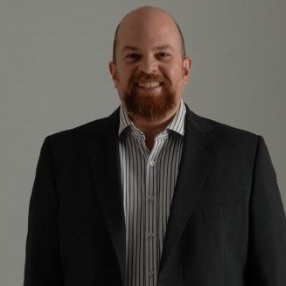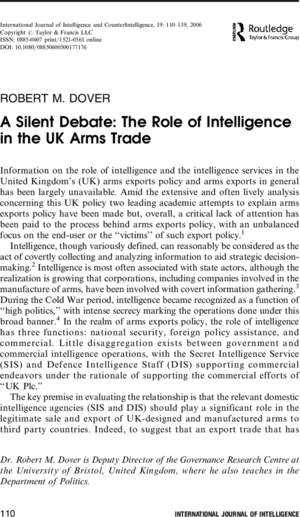Difference between revisions of "Robert Dover"
(→Career) |
(Job) |
||
| (4 intermediate revisions by the same user not shown) | |||
| Line 1: | Line 1: | ||
{{person | {{person | ||
|wikipedia= | |wikipedia= | ||
| − | | | + | |companieshouse=https://beta.companieshouse.gov.uk/officers/LVlZxrgbfFlDpOKQtbc10SOabvk/appointments |
| + | |amazon=https://www.amazon.co.uk/Europeanisation-British-Defence-Policy-1997-2000/dp/B001P9RKVW | ||
|alma_mater=Nottingham University, Bristol University, King's College London | |alma_mater=Nottingham University, Bristol University, King's College London | ||
|image=Robert Dover.jpg | |image=Robert Dover.jpg | ||
|nationality=UK | |nationality=UK | ||
| − | |description=UK academic with a special interest in UK/Western intelligence agencies. Institute for Statecraft, as is at least one of his graduate students. | + | |description=UK academic with a special interest in UK/Western intelligence agencies. Institute for Statecraft, as is at least one of his graduate students. His name had been removed from the IfS website by 10 January 2019. |
|interests=Arab Spring, Intelligence agencies, arms trade | |interests=Arab Spring, Intelligence agencies, arms trade | ||
| − | |birth_date= | + | |birth_date=November 1977 |
|birth_place= | |birth_place= | ||
|death_date= | |death_date= | ||
|death_place= | |death_place= | ||
| − | |constitutes=academic | + | |constitutes=academic, deep state operative |
|employment={{job | |employment={{job | ||
| + | |title=Professor of Criminology | ||
| + | |employer=University of Hull | ||
| + | |start=February 2021}}{{job | ||
|title=Associate Professor in Intelligence and Security | |title=Associate Professor in Intelligence and Security | ||
|employer=University of Leicester | |employer=University of Leicester | ||
|ref=https://www2.le.ac.uk/departments/politics/people/dr-robert-dover}} | |ref=https://www2.le.ac.uk/departments/politics/people/dr-robert-dover}} | ||
| − | }} | + | }}'''Dr. Robert Matthew Dover''' is a [[UK]] academic with [[UK FCO]] connections. He was listed as a senior fellow of the [[Institute for Statecraft]] website on 25 November 2018,<ref name="n25"/> but his name was gone by 10 January 2019<ref name=j29>https://archive.ph/tClxl</ref>. His speciality was listed as "Defence Industry, Hyper-competition, Intelligence".<ref name="n25">http://archive.ph/Df5eb</ref> His name is on the membership list of the [[Integrity Initiative/Cluster/UK/Inner Core|II's inner core]]. |
| − | '''Dr. Robert | ||
==Background== | ==Background== | ||
| Line 24: | Line 27: | ||
==Career== | ==Career== | ||
[[image:Robert Dover on the arms trade.png|thumbnail|The start of one of Robert Dover's papers|left|300px]] | [[image:Robert Dover on the arms trade.png|thumbnail|The start of one of Robert Dover's papers|left|300px]] | ||
| − | "In May and June 2010 Robert Dover and [[Michael Goodman]], with AHRC funding, ran a series of 5 policy seminars on Lessons Learnt from the History of British Intelligence and Security. These were held in partnership with the [[Foreign and Commonwealth Office]] (FCO), the Cabinet Office, King’s College London and The Royal United Services Institute (RUSI)". | + | "In May and June 2010 Robert Dover and [[Michael Goodman]], with AHRC funding, ran a series of 5 policy seminars on Lessons Learnt from the History of British Intelligence and Security. These were held in partnership with the [[Foreign and Commonwealth Office]] (FCO), [[the Cabinet Office]], [[King’s College London]] and The [[Royal United Services Institute]] (RUSI)". |
In 2012 he was working for [[Loughborough University]].<ref>https://ahrc.ukri.org/documents/project-reports-and-reviews/ahrc-public-policy-series/adapting-to-the-arab-spring/</ref> | In 2012 he was working for [[Loughborough University]].<ref>https://ahrc.ukri.org/documents/project-reports-and-reviews/ahrc-public-policy-series/adapting-to-the-arab-spring/</ref> | ||
| Line 30: | Line 33: | ||
One of his graduate students, [[Eduard Abrahamyan]], writing on ''"Stages and Motives of NATO Strategy Evolution and Adaptation in the Black Sea region (2004-2016)"'' was also a member of the [[Institute for Statecraft]]. | One of his graduate students, [[Eduard Abrahamyan]], writing on ''"Stages and Motives of NATO Strategy Evolution and Adaptation in the Black Sea region (2004-2016)"'' was also a member of the [[Institute for Statecraft]]. | ||
| + | ==Opinions== | ||
| + | |||
| + | ===Al-Yamamah=== | ||
{{QB|Commenting on the [[Al-Yamamah]] [[arms trade]] before the [[Foreign Affairs Select Committee]], Dr Robert Dover and Professor [[Mark Phythian]] of the [[University of Leicester]] called it “a strategically important liaison relationship that provides hard and soft intelligence to the UK, and in providing the UK with the retention of some influence and so diplomatic advantage in the Middle East.”<ref>https://publications.parliament.uk/pa/cm201617/cmselect/cmbis/679/67907.htm</ref>}} | {{QB|Commenting on the [[Al-Yamamah]] [[arms trade]] before the [[Foreign Affairs Select Committee]], Dr Robert Dover and Professor [[Mark Phythian]] of the [[University of Leicester]] called it “a strategically important liaison relationship that provides hard and soft intelligence to the UK, and in providing the UK with the retention of some influence and so diplomatic advantage in the Middle East.”<ref>https://publications.parliament.uk/pa/cm201617/cmselect/cmbis/679/67907.htm</ref>}} | ||
Latest revision as of 21:21, 11 June 2021
(academic, deep state operative) | |||||||||||||||||||
|---|---|---|---|---|---|---|---|---|---|---|---|---|---|---|---|---|---|---|---|
 | |||||||||||||||||||
| Born | November 1977 | ||||||||||||||||||
| Nationality | UK | ||||||||||||||||||
| Alma mater | Nottingham University, Bristol University, King's College London | ||||||||||||||||||
| Member of | Institute for Statecraft, Integrity Initiative/Cluster/UK/Inner Core | ||||||||||||||||||
| Interests | • “Arab Spring” • Intelligence agencies • arms trade | ||||||||||||||||||
UK academic with a special interest in UK/Western intelligence agencies. Institute for Statecraft, as is at least one of his graduate students. His name had been removed from the IfS website by 10 January 2019.
| |||||||||||||||||||
Dr. Robert Matthew Dover is a UK academic with UK FCO connections. He was listed as a senior fellow of the Institute for Statecraft website on 25 November 2018,[2] but his name was gone by 10 January 2019[3]. His speciality was listed as "Defence Industry, Hyper-competition, Intelligence".[2] His name is on the membership list of the II's inner core.
Background
"BA, MA (Nottingham), PhD (Bristol), PGCAP (KCL)"[4]
Career
"In May and June 2010 Robert Dover and Michael Goodman, with AHRC funding, ran a series of 5 policy seminars on Lessons Learnt from the History of British Intelligence and Security. These were held in partnership with the Foreign and Commonwealth Office (FCO), the Cabinet Office, King’s College London and The Royal United Services Institute (RUSI)".
In 2012 he was working for Loughborough University.[5]
One of his graduate students, Eduard Abrahamyan, writing on "Stages and Motives of NATO Strategy Evolution and Adaptation in the Black Sea region (2004-2016)" was also a member of the Institute for Statecraft.
Opinions
Al-Yamamah
Commenting on the Al-Yamamah arms trade before the Foreign Affairs Select Committee, Dr Robert Dover and Professor Mark Phythian of the University of Leicester called it “a strategically important liaison relationship that provides hard and soft intelligence to the UK, and in providing the UK with the retention of some influence and so diplomatic advantage in the Middle East.”[6]
Publications
Robert Dover has published several academic papers. He has "a long-standing interest in the study of the international arms trade, and its relationship to political power." In 2012, he contributed to Defence and Security in a Cold Economic Climate: The Impact on Conflict and Competition, a volume edited by IfS director, Chris Donnelly. [7]
References
- ↑ x
- ↑ a b http://archive.ph/Df5eb
- ↑ https://archive.ph/tClxl
- ↑ http://archive.ph/LqYMD
- ↑ https://ahrc.ukri.org/documents/project-reports-and-reviews/ahrc-public-policy-series/adapting-to-the-arab-spring/
- ↑ https://publications.parliament.uk/pa/cm201617/cmselect/cmbis/679/67907.htm
- ↑ https://www2.le.ac.uk/departments/politics/people/dr-robert-dover
